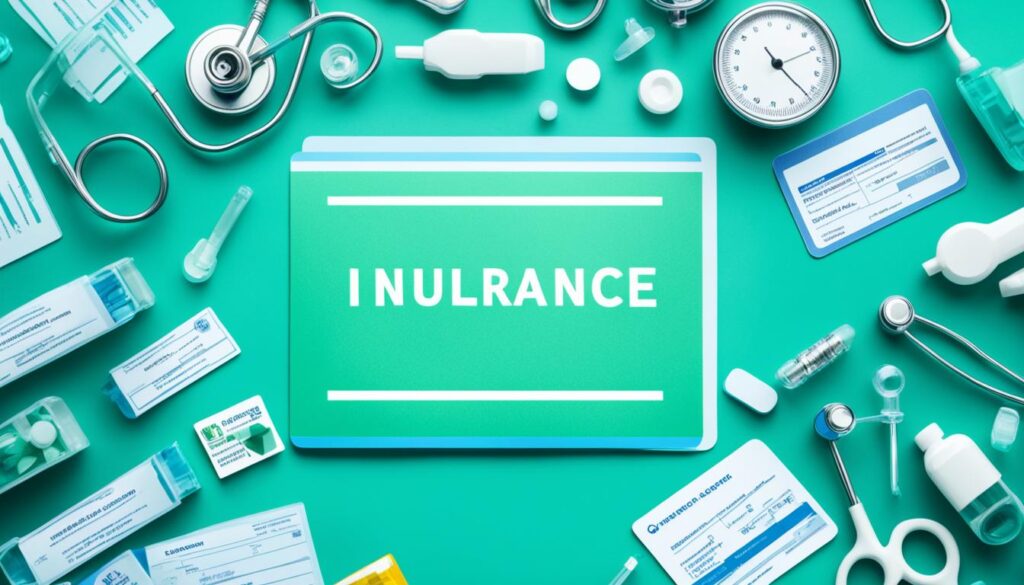No one plans to get sick or hurt. But, most people will need medical care. Health insurance helps with these costs and more. It covers key benefits that keep you well and helps if you get sick or injured. This insurance stops you from facing big bills for medical care. 1 You spend less on health services that are in your plan’s network. This is true even if you haven’t paid your deductible yet. You also get things like vaccines and screenings for free early on. Plus, if you have qualifying coverage by 2018, you won’t get a fine for not being covered.
Key Takeaways
- Health insurance covers essential medical expenses and provides access to preventive care.
- Health insurance protects you from unexpected, high medical costs.
- Preventive care services are covered even before you meet your deductible.
- Having health insurance can help you avoid penalties for being uninsured.
- Health insurance offers financial protection and peace of mind.
The Importance of Health Insurance
About 90 percent of people in the U.S. now have health insurance. This number has grown a lot in the last five years.2 Having health insurance makes it easier to get medical care. It also means fewer people die from health issues, they get better, and they can work more.2 But, there are still over 28 million people without coverage. This is bad for their body, mind, and money.2
Unexpected Health Costs
Health insurance helps pay for important health needs. It stops you from having to pay all your money on hospital bills suddenly.2
Essential Health Benefits
Health insurance takes care of key health services. It’s there for you when you need to get better or stay healthy.2
Preventive Care Services
You can get shots, tests, and check-ups without paying anything first. Health insurance pays for these important ways to stop sickness before it starts.2
Improved Access to Healthcare
Having health coverage means better access to important healthcare. People with Adult Medicaid coverage are five times more likely to have places they go to for care. They’re also four times more likely to get preventative care services compared to those without insurance.2 For kids with Medicaid, it’s four times more likely they have a place for care. Plus, they’re two to three times more likely to get preventative care compared to kids without insurance.2 This better access to regular and early care helps improve the health of people with insurance.2
Regular Sources of Care
Being covered means you’re likely to have a regular place for care. This makes it easier to find problems early and get treated. Medicaid expansion has really helped with this. Places with expanded Medicaid see more diabetes and cancer caught early, and better help for mental health and addiction.2
Timely Diagnosis and Treatment
If you have health insurance, it’s easier to catch and treat health problems early. This is key for conditions like diabetes, asthma, and heart problems.2 It means better health and life for those insured. They can get the medicines and care they need faster.2

Enhanced Health Outcomes
Comprehensive health coverage is vital for more than just paying medical bills. It helps to boost your overall health and happiness. Studies show that when more people have health insurance, fewer of them die.2
For instance, after Massachusetts made Medicare and private plans more available, fewer people died due to all causes. This is a big deal. It means people lived longer.2 Not just that, but the chance of dying from heart-related problems dropped too.2 More folks in places where health coverage has grown, have also kicked the habit. This is because their insurance helps with stop-smoking programs.2
Reduced Mortality Rates
Making health insurance more widespread helps lower death rates in the country.2 Those with coverage feel better about their health. Most say they’re in top shape after getting Medicaid in their states2. This proves that getting good healthcare brings real health gains.
Better Management of Chronic Conditions
Health insurance is especially key for handling long-term health problems.2 Places that extended Medicaid had more folks find out they had diabetes. They also got to have surgery and cancer help sooner.2 In these areas, people could also get meds easily for conditions such as diabetes, asthma, and heart issues.2 More insurance means finding issues early, taking care of them better, and doing better health-wise.
Financial Protection and Well-being
Health insurance is more than just a safety net for health costs. It plays a key role in protecting your money. It does this by making medical care more affordable,2 which helps prevent debts. States where more people have health insurance report less trouble paying for care. They also skip less medicine because they can’t afford it.2
Lower Out-of-Pocket Expenses
Health insurance starts saving you money even before your deductible. For example, fixing a broken leg can cost up to $7,500,3 while a 3-day hospital stay costs about $30,000.3 After your deductible, insurance covers 60% to 90% of the remaining bill.3 This greatly reduces what you have to pay out of pocket.3
Reduced Medical Debt
Medical debt can lead to more financial problems. It can bring about credit card debt, trouble buying essentials, less savings, and bad credit. A 2019 study found that for two out of three bankruptcy cases, medical bills were a major cause.1
Improved Financial Health
In Michigan, after expanding Medicaid, people became financially healthier. They had fewer unpaid medical bills.2 Cancer care is very expensive, sometimes costing hundreds of thousands of dollars.3 Health insurance protects us from these costs, making sure our finances and health are secure.
Why should I get health insurance?
Enrolling in health insurance can shape your future. Studies show covered people have better health. They save more money on medical care and avoid going bankrupt. In California, 90 percent of those who sign up for health insurance via Covered California get help paying for it.1

Health insurance takes care of vital needs, like illness and accidents. It shields you from high unexpected medical expenses. Plans include ER visits, doctor and hospital fees, pregnancy care, and help for mental health.
Health insurance makes essential coverage more affordable. Also, Medicaid provides free or cheaper health care for those who qualify.4
You’ll save cash on health bills, even before meeting your deductible, with health insurance. Most checkups are free, saving you a lot. On average, insured folks pay half the usual cost for medical services.
Insurance companies work out better prices with doctors and hospitals. So, it’s more cash back in your wallet.5
Having health insurance also keeps you healthier. It means you’re more likely to keep up with checkups. You get early treatment for health troubles, too.1
Plus, insurance leads to more mental health and substance abuse care. This is key in fighting the opioid crisis and enhancing mental well-being.5
Choosing health insurance is investing in a better tomorrow. With affordable plans and aid, getting covered is a smart move. It secures your health and helps your wallet, too.
Affordable Coverage Options
Many people avoid health insurance because of its cost.6 But, getting a quality health plan from a well-known brand might not hurt your pocket that much. The reason is simple – there are more ways to get financial help than before. Approximately 90 percent of those signing up with Covered California can get financial aid.7
Premium Tax Credits
You may get help through a premium tax credit or cost-sharing reductions.6 The former means a part of your monthly bill is paid by the government. The latter gives extra money to reduce what you pay from your own pocket, like at the doctor or when filling prescriptions. On average, people get about $5,000 a year to help with their health plan costs. This means many folks pay less than $10 a month for their plan, and some even pay nothing.
Cost-Sharing Reductions
Cost-sharing reductions aim to lower additional health plan costs, like copays or deductibles.6 If you qualify, this can significantly decrease the expenses on your end, making good health insurance more budget-friendly and available to many.
Preventive Care at No Additional Cost
Health insurance offers free preventive care services. This is a big plus for you.8 Thanks to the Affordable Care Act (ACA), all Covered California plans cover these services without added charges.9 You won’t pay for screenings, shots, or advice. It helps you keep fit and find health problems early.
What’s included? Shots, and check-ups are free.8 They also test for high blood pressure and other problems.9 You get tips if you need them. Women get extra care too, like birth control and regular check-ups.9
8 The goal is to find health issues early. The ACA makes sure plans offer many preventive services.9 Groups of doctors have picked out these services to keep people healthy.9 Using these benefits saves you money and keeps you well.
Legal Requirements and Penalties
In California, it’s now a must to have health insurance. The law says every adult and their dependents must be covered. This started in 2020.10 It aims to get more people health coverage. This way, the price of insurance for everyone can go down.10
Individual Mandate in California
If you don’t have health insurance, you could get a fine when you do your taxes. There are some exceptions, though.11 States like California, Massachusetts, and others need their residents to have health insurance. They have special laws for this.11
Tax Penalties for Non-Compliance
Every year, the fine can change depending on how many people in your family are not covered. It could be a lot of money. States where this law is strict check during your tax return.11 But, there are some special cases where you might not have to pay. This could be if you can’t afford it or other personal reasons.11
If you face these fines, it could be tough. It might mean paying all your medical bills yourself. You could also lose money, miss important checks, and have less health care options.11 The fines are usually based on how much you make and how many people are in your family.11
Negotiated Rates with Providers
Health insurance saves money on costs even before hitting the deductible.12 Most preventive care is free, and those with insurance pay about half for medical services.12 Insurers work with providers for better rates, keeping more cash in your wallet.12 In 2019, a study found that adults without insurance were twice as likely to struggle with medical bills than insured people.12
Insurers now have to follow new rules for clear pricing starting July 1.13 Hospitals must show the rates they agree with insurers and what they ask cash patients to pay.13 If hospitals don’t do this, they could face big fines, up to $5,500 a day.13 Insurers also have to pay up to $100 a day per patient if they don’t share agreed rates, forcing them to comply or face high fines.13
Over 700,000 files have been checked by Turquoise Health, equaling about half a petabyte of data.13 They plan on covering 1 to 3 petabytes more soon.13 Insurers must now show the costs for 500 common services online or on paper if patients ask, starting January 1.13 By 2024, costs for all services must be shown.13 The No Surprises Act aims to stop surprise bills from out-of-network care, by requiring clear estimates from providers when needed.13
Insurance companies and medical providers set prices known as negotiated rates.12 Patients benefit by paying less out of pocket at in-network places because these rates are usually lower than standard fees.12 The amount you pay is set by your health plan, based on these rates.12 If you go out of network or lack insurance, you might face higher fees since these rates don’t apply.12
A rule since January 2021 makes hospitals tell patients the rates they’ve agreed with insurers, and other costs, to help people choose affordable care.12 Knowing these rates can help patients make smart healthcare choices and possibly lower prices.12
Group health insurance is often cheaper than solo plans because the risk is spread over more people.14 A medium-sized company cut premiums by 15% by focusing on staff health and preventive care.14 A big retail chain pays rates 30% below average for 20,000 employees, adding telemedicine and mental health benefits free.14 The more people insured, the better the deals and terms they can get.14
Employers lower premiums by choosing health plans based on group wellness and promoting healthy habits.14 Finding the right group plan can save a lot of money for both the company and its workers, making health insurance more affordable.14 Insurers set rates by looking at the group’s risk, market conditions, and their need to be competitive yet profitable.14
Substance Abuse and Mental Health Treatment
Health insurance is key in fighting the opioid crisis and making mental health treatment more available. In West Virginia, when Medicaid expanded, more people could get opioid treatment. By 2016, 75% of those with opioid addiction in Medicaid were getting medicine help. This change also helped young adults, bringing them more mental health visits each month if they had coverage.1516
Access to Behavioral Health Services
The ACA improved access to mental health care. With Medicaid expanding, more could get help for substance use. For instance, after Medicaid expanded, there was a jump in admissions for specialty substance use treatment. This shows how important coverage can be.16
Support for Opioid Epidemic
Health insurance plays a big role in the fight against opioid misuse. In New York, insurers can’t limit needed mental health or substance abuse care. They must set fair costs for outpatient substance use care, similar to regular doctor visits. Plus, they have to check with the state about care needs, and sometimes, they can’t ask for permission before treatment.15
Yet, some people still have a hard time getting help due to where they come from. For example, black and Hispanic groups often have more trouble finishing addiction treatment. And, there are unequal needs for care among different cultures. If someone needs both mental health and substance use help, they may find it even harder to get the treatment they require. These issues need more attention.16
The ACA has done a lot to improve mental health and substance use services. But, we still need to make sure everyone can access the care they need. This way, everyone gets a chance to build a better life.
Community Benefits
Health insurance is crucial, but so is what hospitals do for their areas. In rural spots, hospitals do better financially and are less likely to shut down if Medicaid expands.17 This helps the hospitals stay open and keeps people healthy.
More than money, Medicaid growth means fewer bad crimes and less government spending.17 In Montana, it helped make 5,000 jobs each year from 2018 to 2020. This gave folks around $270 million more in their pockets yearly.17 These numbers show how important healthcare is for everyone in a community.
Improved Hospital Finances
Even though nonprofit hospitals get a lot in tax breaks, they don’t always spend that money on their communities. The best spend only 18 cents on every dollar for community benefits, and the worst spend even less.18 Are they really meeting people’s health needs?
Job Creation and Economic Impact
It’s interesting that not-for-profit hospitals are doing so well financially.19 This means they can do more for the economy and jobs in their areas. They can make a big positive effect on the entire community, not just on healthcare.
Looking at the big picture of health insurance, hospitals are key to a community’s health, not just by treating patients. They help start initiatives, keep finances strong, and grow the economy. This makes their role truly meaningful for the people they serve.
FAQ
Why should I get health insurance?
What are the essential health benefits of health insurance?
How does health insurance help with preventive care?
How does having health insurance improve access to healthcare?
How does health insurance coverage impact health outcomes?
How does health insurance provide financial protection?
How affordable is health insurance in California?
Why should I get health insurance?
What are the essential health benefits of health insurance?
How does health insurance help with preventive care?
How does having health insurance improve access to healthcare?
How does health insurance coverage impact health outcomes?
How does health insurance provide financial protection?
How affordable is health insurance in California?
FAQ
Why should I get health insurance?
Health insurance is important for keeping you physically, mentally, and financially safe. It helps cover your health needs, including unexpected medical costs. It also gives you access to check-ups and other services to keep you well.
What are the essential health benefits of health insurance?
Health insurance includes doctor visits, hospital stays, and medicine, among other things. It’s key for your health upkeep and for treating any health issues you might face.
How does health insurance help with preventive care?
With health insurance, you can get certain check-ups and vaccines for free. This happens even before you’ve paid up to your deductible. Preventive care makes sure you find health problems early.
How does having health insurance improve access to healthcare?
If you have health insurance, you’re more likely to see doctors and get services that help prevent sickness. It also means you can get diagnosed and treated quickly. This all helps you stay healthier.
How does health insurance coverage impact health outcomes?
Research has found that having health insurance can lead to lower death rates and help better manage long-term health problems. It is also tied to feeling more satisfied with life. Plus, it’s been shown to lower the chances of heart disease deaths and do other health benefits.
How does health insurance provide financial protection?
Health insurance saves you money by lowering how much you need to pay upfront for healthcare. It can also keep you from getting into debt because of medical bills. People with insurance find it easier to pay for basic needs and don’t see their bills go to collections as much.
How affordable is health insurance in California?
California makes it easier for many people to afford health insurance. About 90% of the state’s residents who sign up through Covered California get help paying their premiums. Some even find plans for as low as
FAQ
Why should I get health insurance?
Health insurance is important for keeping you physically, mentally, and financially safe. It helps cover your health needs, including unexpected medical costs. It also gives you access to check-ups and other services to keep you well.
What are the essential health benefits of health insurance?
Health insurance includes doctor visits, hospital stays, and medicine, among other things. It’s key for your health upkeep and for treating any health issues you might face.
How does health insurance help with preventive care?
With health insurance, you can get certain check-ups and vaccines for free. This happens even before you’ve paid up to your deductible. Preventive care makes sure you find health problems early.
How does having health insurance improve access to healthcare?
If you have health insurance, you’re more likely to see doctors and get services that help prevent sickness. It also means you can get diagnosed and treated quickly. This all helps you stay healthier.
How does health insurance coverage impact health outcomes?
Research has found that having health insurance can lead to lower death rates and help better manage long-term health problems. It is also tied to feeling more satisfied with life. Plus, it’s been shown to lower the chances of heart disease deaths and do other health benefits.
How does health insurance provide financial protection?
Health insurance saves you money by lowering how much you need to pay upfront for healthcare. It can also keep you from getting into debt because of medical bills. People with insurance find it easier to pay for basic needs and don’t see their bills go to collections as much.
How affordable is health insurance in California?
California makes it easier for many people to afford health insurance. About 90% of the state’s residents who sign up through Covered California get help paying their premiums. Some even find plans for as low as $0 each month.
What preventive services are covered at no additional cost?
Through Covered California, all plans offer certain services for free. This includes things like vaccines, screenings, and counseling for issues such as depression and STIs. There’s no extra cost to you for these services.
Is health insurance required in California?
Yes, California makes it mandatory for adults and their dependents to have health insurance. If you don’t get coverage, you could face a tax fine. But there are cases where you don’t have to pay this fine, like if you qualify for an exemption.
How does having health insurance impact healthcare costs?
With health insurance, you can get medical services at a lower cost. This is because the insurance companies have agreements with health providers. So, even before your deductible, you end up paying less.
How does health insurance coverage support substance abuse and mental health treatment?
Having health insurance is key in making treatments for issues like drug use and mental health more available. Including these services in coverage has been shown to help, especially among young adults with mental health problems.
What are the community benefits of health insurance coverage?
Health insurance doesn’t just help individuals; it also betters the whole community. It boosts hospitals’ financial health, cuts down on crime, and helps create jobs. Expanding Medicaid is tied to these community-wide gains.
What preventive services are covered at no additional cost?
Is health insurance required in California?
How does having health insurance impact healthcare costs?
How does health insurance coverage support substance abuse and mental health treatment?
What are the community benefits of health insurance coverage?
each month.
What preventive services are covered at no additional cost?
Through Covered California, all plans offer certain services for free. This includes things like vaccines, screenings, and counseling for issues such as depression and STIs. There’s no extra cost to you for these services.
Is health insurance required in California?
Yes, California makes it mandatory for adults and their dependents to have health insurance. If you don’t get coverage, you could face a tax fine. But there are cases where you don’t have to pay this fine, like if you qualify for an exemption.
How does having health insurance impact healthcare costs?
With health insurance, you can get medical services at a lower cost. This is because the insurance companies have agreements with health providers. So, even before your deductible, you end up paying less.
How does health insurance coverage support substance abuse and mental health treatment?
Having health insurance is key in making treatments for issues like drug use and mental health more available. Including these services in coverage has been shown to help, especially among young adults with mental health problems.
What are the community benefits of health insurance coverage?
Health insurance doesn’t just help individuals; it also betters the whole community. It boosts hospitals’ financial health, cuts down on crime, and helps create jobs. Expanding Medicaid is tied to these community-wide gains.
Source Links
- https://www.ncbi.nlm.nih.gov/books/NBK223643/
- https://www.aha.org/guidesreports/report-importance-health-coverage
- https://www.healthcare.gov/why-coverage-is-important/protection-from-high-medical-costs/
- https://www.healthcare.gov/young-adults/ready-to-apply/
- https://www.cigna.com/knowledge-center/why-do-you-need-health-insurance
- https://www.ehealthinsurance.com/affordable-health-insurance
- https://www.tdi.texas.gov/consumer/health-insurance-shopping-guide.html
- https://www.cigna.com/knowledge-center/preventive-care
- https://www.kff.org/womens-health-policy/fact-sheet/preventive-services-covered-by-private-health-plans/
- https://www.healthpartners.com/blog/is-health-insurance-required/
- https://www.ehealthinsurance.com/resources/individual-and-family/does-your-state-require-you-to-have-health-insurance
- https://yourcareeverywhere.com/healthcare-choices/price-transparency-in-healthcare/what-is-a-negotiated-rate-for-healthcare-.html
- https://kffhealthnews.org/news/article/health-insurance-price-data-access/
- https://www.decent.com/blog/unlocking-the-mystery-the-art-and-impact-of-negotiating-group-plan-rates
- https://www.dfs.ny.gov/consumers/health_insurance/new_york_health_insurance_policies__programs/mh_sud
- https://www.ncbi.nlm.nih.gov/pmc/articles/PMC7546457/
- https://www.aha.org/community-benefit
- https://lowninstitute.org/5-things-you-need-to-know-about-hospital-community-benefit-spending/
- https://www.ncbi.nlm.nih.gov/pmc/articles/PMC8246580/
 Gmrxe Entertainment and Information
Gmrxe Entertainment and Information





insurance | Long-Term Care Insurance: Long-term care insurance can help cover the costs of extended care that Medicare and traditional health insurance don’t cover. MAFA Insurance suggests considering this policy early to lock in lower premiums.
insurance | Insurance for Seasonal Businesses: Seasonal businesses face unique risks, including fluctuating income and potential liabilities. MAFA Insurance helps these businesses find flexible coverage that adjusts with their operational needs.
insurance | Insurance and Estate Planning: Integrating life insurance into your estate plan can provide liquidity to cover estate taxes and other expenses. MAFA Insurance partners with estate planners to ensure our clients’ insurance policies align with their overall financial goals.
insurance | Recreational Vehicle Insurance: RVs need specialized coverage that combines vehicle and home insurance elements. MAFA Insurance helps RV owners find policies that cover them on the road and at campgrounds.